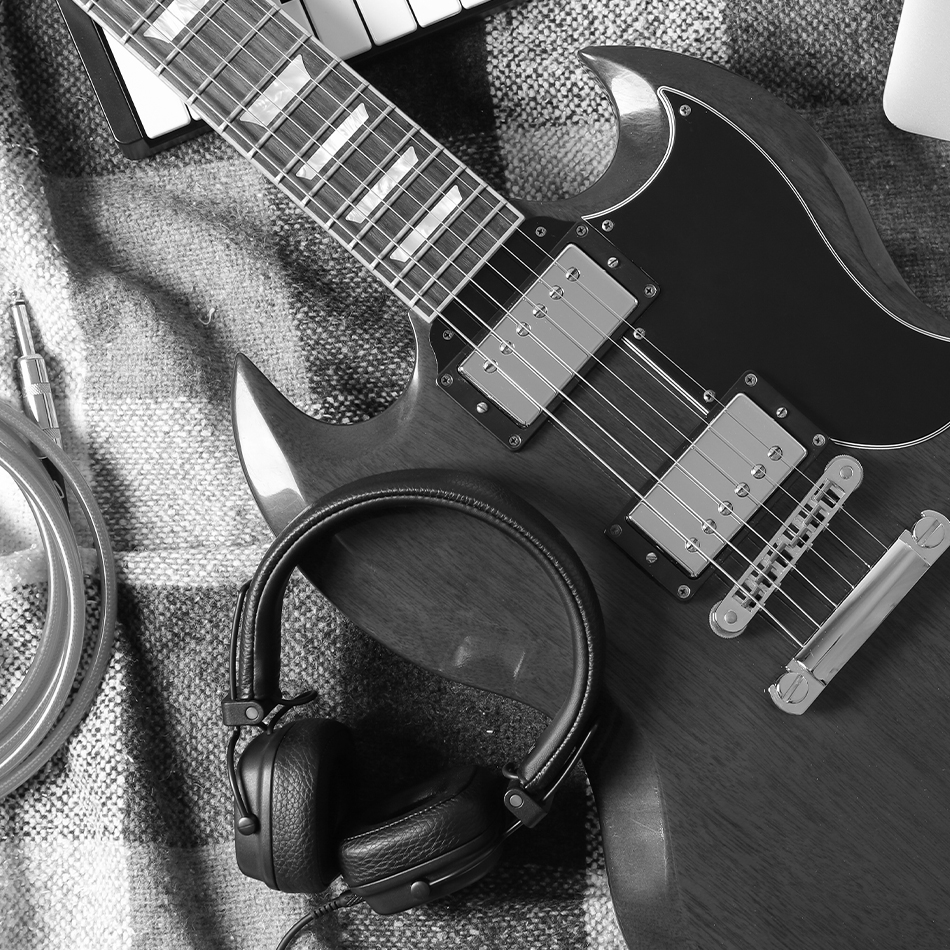Music is what makes your audience’s emotions tick and can certainly make your ads memorable. Most of us think that today’s world is heavily influenced by visuals, but music is second to none. Have you seen how many people wear headphones nowadays?
This right here is a goldmine for you to make sure everyone hears your brand’s voice, and music is what’s going to help you get there. In this article, we’ll look at the role music plays in advertising. Then we’ll dive into chord progressions and musical notation you need that are the building blocks of a perfect melody.
Love music, don’t you? So, let’s get started!
The Power of Music in Advertising
Music is indeed quite powerful. It makes people cry and smile and even takes them down memory lane. Some, if not all, of those emotions and feelings are just what you need to inspire your audience to make a purchase.
It’s no secret that ads with some type of music perform better than those without it. However, the music genre you use varies from one category to the other. Think about it, you wouldn’t want to have classical music like Jazz from the 1960s for an ice commercial, would you?
You’d ideally opt for more catchy melodies that make your target audience smile. So, the question here is how exactly are we going to know which music genre to choose? Well, for that, you’ll need to learn a thing or two about music composition.
The Role of Musical Composition
Before diving into music theory and the role of music, you must know composing music isn’t an easy thing to do. Some musicians say you need to learn music theory and sheet music. Others don’t prefer a music school and rely on their natural musical skills to write music.
Music composition is basically when a musical instrument is used to craft songs and melodies. The composition is based on varying chord progression and musical notations.
The sounds coming from these different instruments are recorded using music production equipment and refined using music software. What you need to understand here is music triggers emotions which then drives customer’s purchase decisions.
However, these emotions get triggered as a direct result of the chord progression and musical notations that were used. This is the backbone of the music composition services we provide at BKP.

Understanding The Purpose
The most critical step to crafting captivating melodies for your ad campaigns is to understand the end-purpose of the ad. Now, this might not be as simple and easy as it seems. Understanding the purpose can be divided based on three factors which include:
Defining The Objective
Before you begin to create music or start writing melodies, you need to define your ad’s purpose. This’ll help you determine what music works for you and what doesn’t. Think about things like raising awareness or building loyalty.
Identifying The Target Audience
Next up, you need to think about who your ad is for. The musical ideas you have for your campaign will differ based on your target audience. Popular music can help you attract a younger audience, but you’ll need an old song if your audience is over 50.
Analyzing Brand Identity
Your brand identity is anything and everything that helps that customer recognize your brand, and that includes music. It’s what gives your brand a personality. It helps you take your level up your sonic branding up.
CONTACT US
Elements Of Effective Advertising Music
When it comes to great music, tempo, pitch, and texture can help you make the cut. But music in advertising is a bit more complicated than that. Effective ad music is based on:
Emotional Resonance
Emotional resonance is basically when the music in your ads helps the content be more meaningful to your customers. You can do this by:
- Making sure that the music tone you use is perfect. This isn’t easy, and you might need to learn music composition if you plan to write your own music.
- Eliciting the desired emotions using music. You’ll need to have musical knowledge and notation software to do this.
Memorability
You don’t want your ads to be just meaningful, you want people to remember them, and that’s what creating memorability is all about. You can do this by:
- Creating catchy melodies using different textures that people love and can’t get out of their heads.
- Crafting hook-filled choruses with a mesmerizing baseline and a piece of music that no one can forget.

Elements Of A Compelling Advertising Composition
Creating compelling music for advertising is challenging, and you might need to work with some successful composers to do so. Before you choose to work with composers, make sure they can adapt to different genres.
Just one piece of music won’t be enough for your brand. A successful composer, working with real musicians, will also understand the cultural context of your ad. They will also be able to match new compositions to your target demographics.
A music composition for an ad is different from a musical performance and is based on:
- Structure and dynamics – a music composition is based on music theory and uses captivating instrumental pieces and a string quartet every now and then.
- Melodic development – a music composition doesn’t dive right into the melody. It uses things like an orchestral piece and music notations to ease into it.
- Rhythmic and percussive elements – advertising music composition uses recurring beats and rhythm patterns that help your capture and retain your audience’s attention.
- Vocal consideration – whether a music composition for your ad will contain vocals or not depends on the platform the ad is for. Including vocals can make your ads more captivating.

Evoking Emotions And Storytelling
Effective music composition for your ads will also include musical arches to build a story. These arches can help shape the narrative of your ads, and music is used to heighten the drama and tension.
Music Composition Techniques For Different Formats
Today, there are a number of platforms people use to consume information. Music composition requirements for each of these platforms vary, and you need to consider this before writing music. These platforms include:
- TV – generally around one minute long, so you have time to use music composition to build your melody.
- Digital – very short in duration, so you want to use instrumental music to jump into the melody right away.
- Radio – no visuals here, so your music composition should focus on your brand identity and narrative.
- Branded Content and Documentaries – long-form content that allows your music composition to truly showcase your narrative and brand identity.

Building a Creative Brief For Composers
When you work with a composer or a world-class production company to create music, you’ll need to provide them with a brief. It’s important to establish clear communication. This’ll help them know what your ad should feel like.
Many composers also require your brand’s vision and the goals of the ad campaign. You can even share references and examples of ads you found in online communities with the composer. But that’s not all you should know, there’s more!
CONTACT US
Working with Composers and Music Production Teams
You also need to know working with successful composers is a time-consuming process. It requires constant collaboration with real musicians and feedback. This can help nurture all the creativity and innovation that goes into your ad campaign’s music composition. You never know where inspiration strikes. In addition, working collaboration can also help you balance budget considerations and is better than creating your own music.
CONTACT US
Leveraging Sound Design and SFX
SFX is that new taste of music in the younger generations which is now gaining more purchasing power. Successful composers know that a full orchestra using lead sheets and real instruments might not be as effective anymore.
These composers are able to combine music notation with SFX music sounds, helping you create memorable ad songs your audience will love. In addition, music notation and SFX sounds can also be combined to create sound design and logos.
CONTACT US
Successful Music Compositions In Advertising
Now that you know about writing music and creating a melody for your ads, let’s look at some of the most successful jingles of all time.
- I’m Loving It – this is the iconic McDonald’s melody that debuted in 2003. McDonald’s spent over $1.37 billion on advertising it and translating it into 11 different languages.
- Five Dollar Foot Long – this melody was used to promote Subway’s iconic campaign and was the tune in everyone’s mind back in 2008.
- 800 Number – this melody was an example of sheer advertising intelligence by Lynn Hauldren, who cleverly turned the company’s contact number into a catchy melody.
- Give Me A Break – this melody dates back to KitKat’s marketing campaign in the 1980s. It used swift rhythms and blues music to catch the audience’s attention.
- I’m A Big Kid Now – you probably don’t remember you becoming a big kid, but you’ve probably heard of this Huggies melody that dates back to 1994.
Conclusion
Playing music in a rock band is different from creating a melody for an ad. Music composition for advertising depends on your understanding of music theory and audience. Music can be used to evoke emotions and create a lasting impression.
It’s also important to analyze the results of your musical compositions by looking at customer engagement and retention rates. Reach out now and learn more about how we craft captivating melodies for your ads.
Unveiling Musical Composition: Delving into Sound Components
Exceptional Music Composition Services in Dubai



